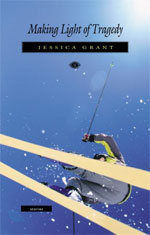
Jessica Grant has reminded me to exercise some long-neglected, or perhaps never fully understood or appreciated muscles. Throughout the exhilarating journey through the short stories of Grant’s Making Light of Tragedy, I sensed something charmingly, arrestingly askew in each story’s setting, interplay of characters and/or narrator’s voice … but could not quite zero in on what it was, and why it felt pleasantly dizzying, but not queasy-making.
Then I came to “Milaken”, the final, most extended and quirkily warmest story of a heart melting series, and I had my answer:
“Tad shuts his eyes and convinces himself his bed is in a different part of the room. This requires a certain muscle, which not everyone has, and which must be exercised regularly and built up, over time. It is not just a matter of visualizing. It is a matter of believing.
Tad trained himself as a kid by rearranging the furniture in his bedroom. Every Sunday, he pushed his bed into a new position – up against a different wall, into a new corner. He bisected the room four different ways, blocked the closet, blocked the door. Until he could move the bed around in his head, with himself in it, and believe in each new position, one hundred percent.”
You don’t just picture the fate of the Olympic ski jumper – Grant convinces you of it, through the grammatical certainty of his bewildered but unwavering wife. You don’t just see the cozy dinner party circle with the Dean of Humanity and imagine theorizing about where in the world you would take a war criminal – Grant forever alters that place in your world. You don’t just immediately see and hear the familiar faces and voices of Peter Mansbridge and Chantal Hebert – Grant has made you certain that Chantal will indeed give Peter a friendly punch the next time you tune in to the At Issue panel. Grant doesn’t just make you see, she makes you believe, however vaguely off-kilter each story’s world is. On one hand, you might find it over the top that a young girl at a birthday party would precociously declare herself suicide bomber O-Sara bin Laden, but then on the other hand, mere pages later, when Peter’s newcast includes an abrupt, segue-less report of a female suicide bomber who seems to have changed her mind … well, you’re convinced and it’s very real.
Tad illustrates what Grant does with each story in Making Light of Tragedy. As he rearranges his furniture (and later teaches his daughter to do the same thing, a gift as wonderful as her marvellous name), so does Grant take characters and keeps reinserting them back in their own, slightly altered stories, with the elements moved around just a touch (oh, a Tad!) … and checks again to see how they’re coping. The steps to falling out of love and then into unattainable or implausible love to cope makes strange, mad but then oddly feasible sense. An entanglement of complicated multisexual office romances escalating to possible threats of violence suddenly boils down to two people trying to sort it out in an office cubicle, perhaps a cubicle that you walked past at work today.
Jessica Grant came to popular and critical attention in 2009 with her first novel, Come, Thou Tortoise. This short story collection predates the novel by about four years, and the story “My Husband’s Jump” was a Journey Prize winner in 2003. Having read Making Light of Tragedy first, this reader is now eager, ready and willing, with the seeing and believing muscles suitably trained, to move on to the novel and to look forward to more from this preternaturally assured author.
Thank you to The Porcupine’s Quill for providing a review copy of Making Light of Tragedy, by Jessica Grant.
